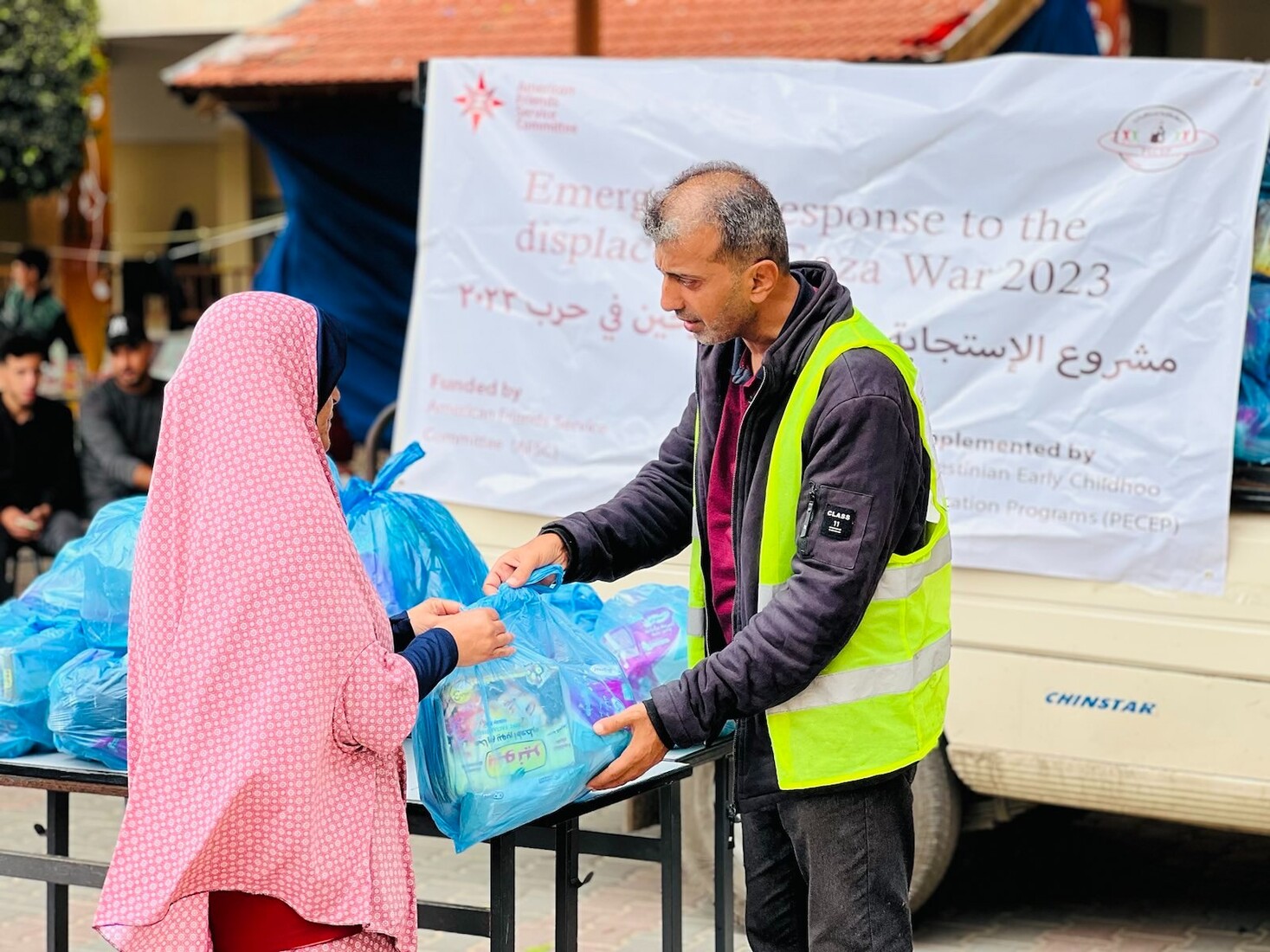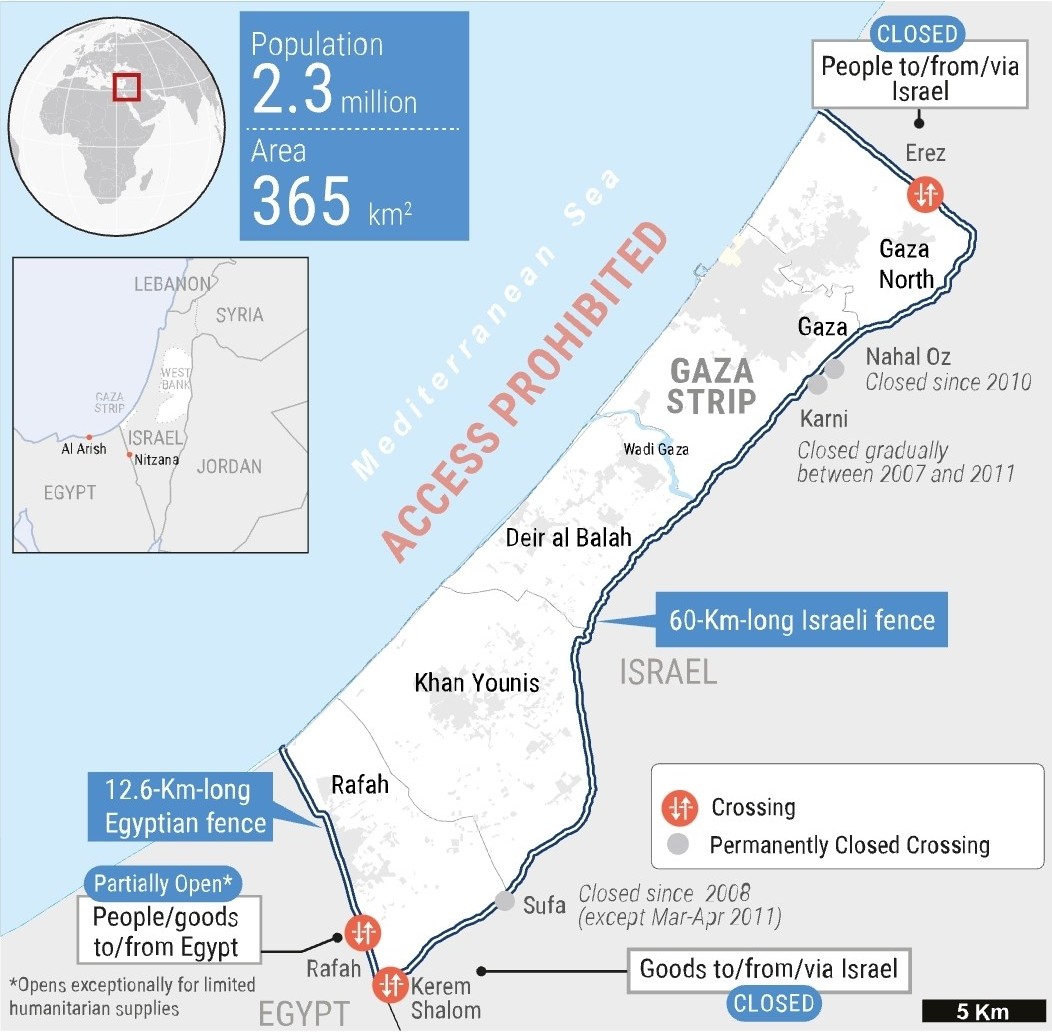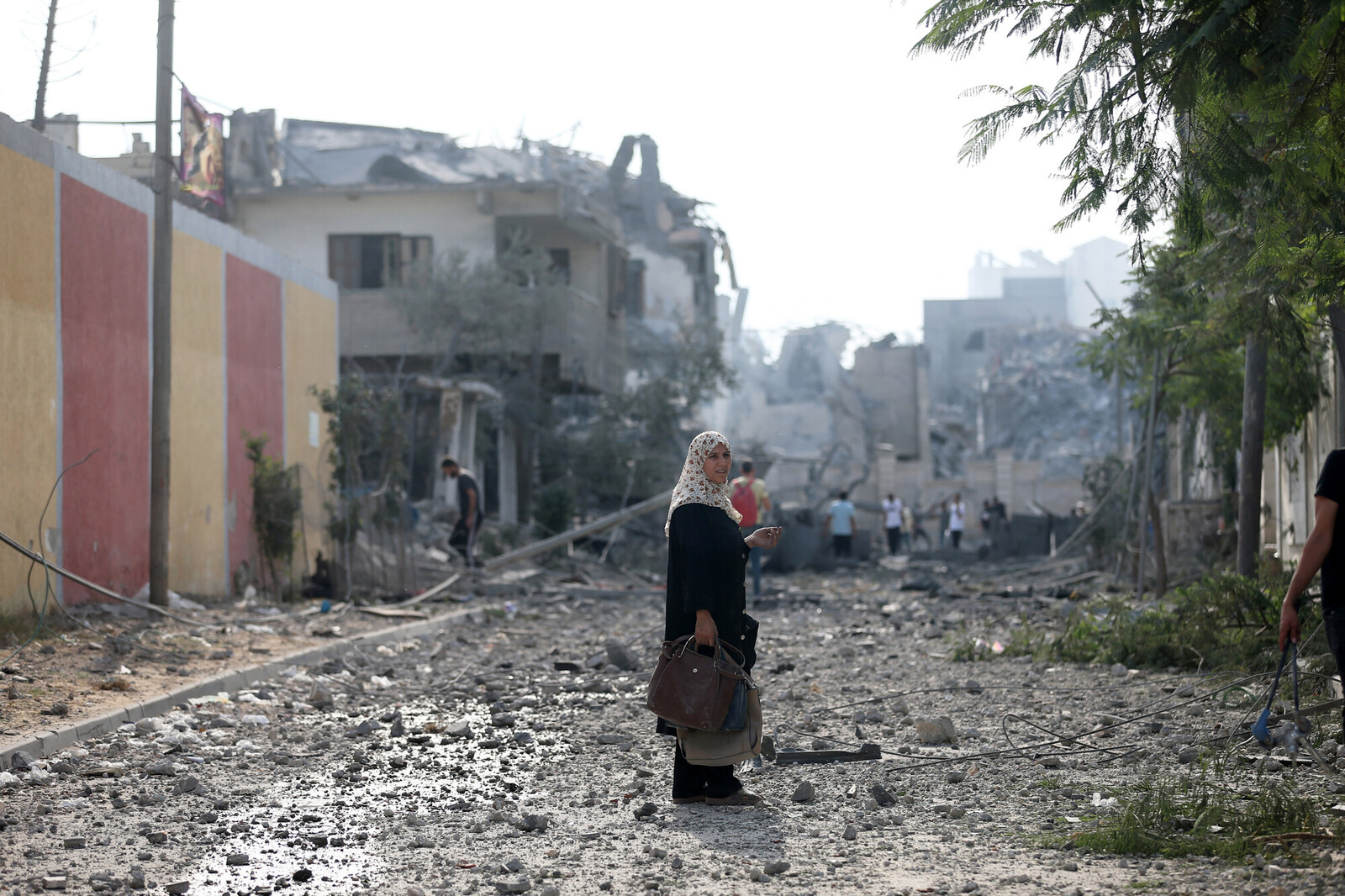
AFSC's Firas Ramlawi distributes food at a shelter in Gaza. Basel Zanoon
AFSC has offices and staff in Jerusalem, Gaza, the West Bank, and Jordan. Today, we are providing humanitarian relief to Palestinians in Gaza and the West Bank—as we advocate for a permanent cease-fire and protection for the Palestinian people.
Here’s the latest from our Middle East team on the situation facing Palestinians and how AFSC is responding to the crisis.
By the numbers: The human toll in Palestine since Oct. 7
GAZA
- 16,248+ killed
- 7,000+ buried under the rubble
- 43,616+ injured
- 1.93 million displaced
- 4,000+ arrested
- 50,000+ homes destroyed
WEST BANK
- 260 killed
- 3,200 injured
- 1,300+ displaced
- 3,480 arrested
- 180 homes destroyed
Sources: Gaza Ministry of Health, UNOCHA

Source: Government media office, Gaza Ministry of Health
The humanitarian situation in Gaza
After a temporary cease-fire that lasted just a few days, Israel has intensified significantly the bombardments over Gaza. And the humanitarian situation in Gaza remains at its gravest point. The total population of Gaza—2.3 million Palestinians—is in urgent need of humanitarian aid.
Lack of safety and security: Nowhere is safe in Gaza. On Oct. 8, Israel bombed a protected building that houses all international organizations in Gaza, including AFSC’s office. Israel is bombing everything everywhere—residential buildings, hospitals, shelters, refugee camps, schools, children, women, seniors, health workers, and humanitarian workers—with complete disregard for human life. People are dying from the Israeli shelling but also from hunger, thirst, and disease due to the complete blockade Israel has imposed on the Gaza Strip.
Lack of humanitarian access: The only entry point of aid to Gaza is the Rafah border with Egypt. All other entry points are now closed. Israeli authorities control what aid can enter Gaza. Currently, only food, water, medicine, some winterization items, and a limited quantity of fuel have been authorized by Israel to enter Gaza. The aid being provided falls far below what is needed. Before Oct. 7, about 500 trucks of aid would enter Gaza daily, which was insufficient. Since Oct. 21, only an average of 100 trucks per day have been allowed to enter daily.
Rising public health concerns: The lack of fuel and security remains one of the biggest challenges to resuming humanitarian operations. Since Israel imposed on a total siege over Gaza on Oct. 11 and totally cut off the electricity and water supply and the access of fuel, all critical services (such as hospitals, waste management, and the desalinization plant) have completely collapsed. The lack of medicine, water, food, sanitation, and other essential supplies—combined with poor living conditions and severe overcrowding in shelters—have also increased the risk of disease. Diarrhea, acute respiratory conditions, and skin infections have spread.
Vulnerable groups in difficult conditions: Several groups are especially vulnerable due to the lack of proper shelter, health and basic services. That includes people with disabilities; women who are pregnant, have recently given birth, or are breastfeeding; people who are recovering from injuries or surgeries; seniors; children, especially newborns; and those with compromised immune systems.
Safety of health care workers: The insecurity and targeting of health facilities and workers have hampered emergency responses. Many health workers have been arrested by the Israeli army and the health sector has collapsed. Only nine health facilities and two main hospitals in the South are partially functioning. Health professionals are exhausted. They are facing the same fate as all other Palestinians in Gaza.

At a shelter in Gaza, AFSC and partners organized an open day of activities for children. Mayar Ramlawi
AFSC’s emergency relief efforts
In Gaza, AFSC has provided emergency relief to displaced people in the Khan Yunis and Rafah regions of Gaza. In recent weeks, our staff, working with partners, have so far distributed:
- 502 food parcels for 3,600 people with easily prepared items such as luncheon meat, canned cheese, and jam that provide enough to feed a family for two days.
- 770 meals of rice and meat for families, serving 2,370 people.
- 500 family hygiene kits with items such as soap, shampoo, toothbrushes, toothpaste, hairbrushes, nail clippers, ear cotton, wipes, underwear, women's hygiene products, and other sanitary supplies.
Read more about AFSC’s emergency relief.
In the West Bank, Palestinians are increasingly facing arbitrary killings and detentions, home demolitions, daily Israeli army raids, and other human rights violations. Over 150,000 workers from the West Bank, previously employed in Israel and settlements, have lost their jobs due to firing or restricted crossings. There are also thousands of Gaza patients and workers stranded in the West Bank who have not been allowed to return to Gaza.
In recent weeks, AFSC has supported 168 patients from Gaza and their relatives who were receiving treatment in Jerusalem and were forced to relocate to Ramallah during the war. We assisted patients with medical needs and winterization items. Working with partners, we are now providing patients and their families hot meals daily.
How you can help
Contact Congress today: Urge your representatives to call for a total cease-fire and humanitarian access to Gaza.
Give to AFSC’s Gaza emergency response: Your donation will bring humanitarian relief and support ongoing efforts to stop the violence, address its root causes, and build conditions for peace.
